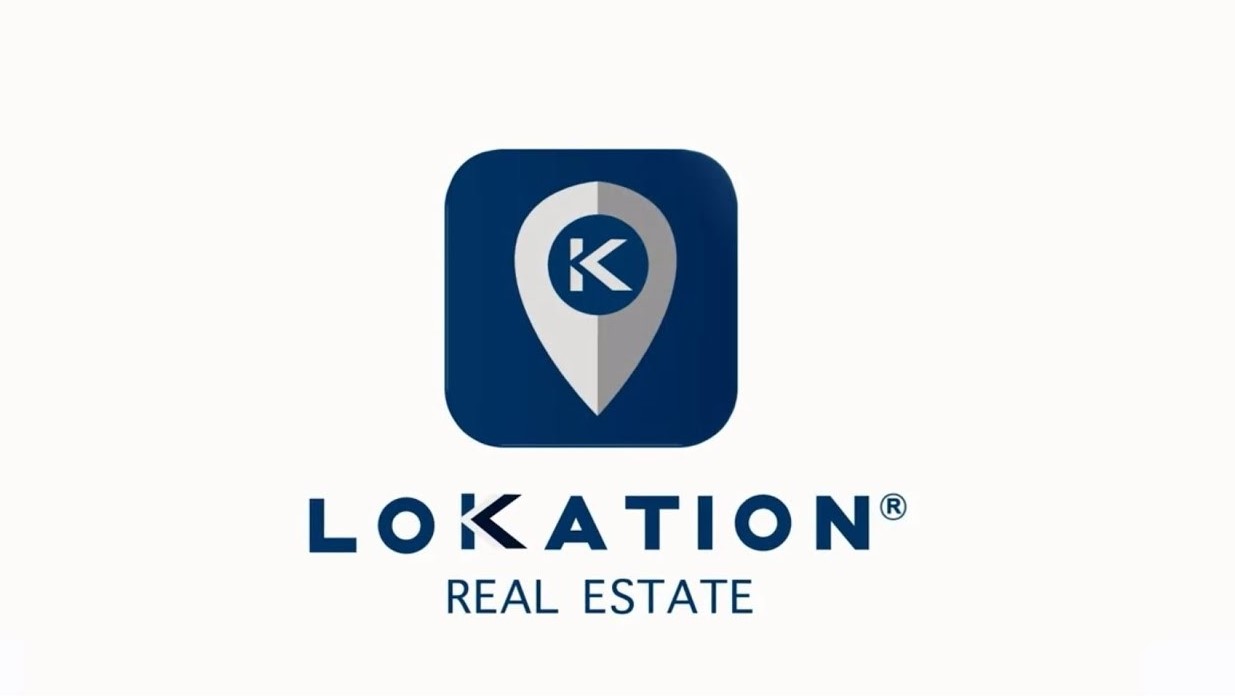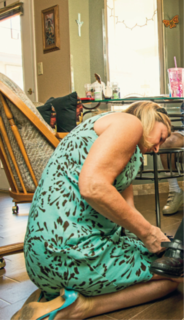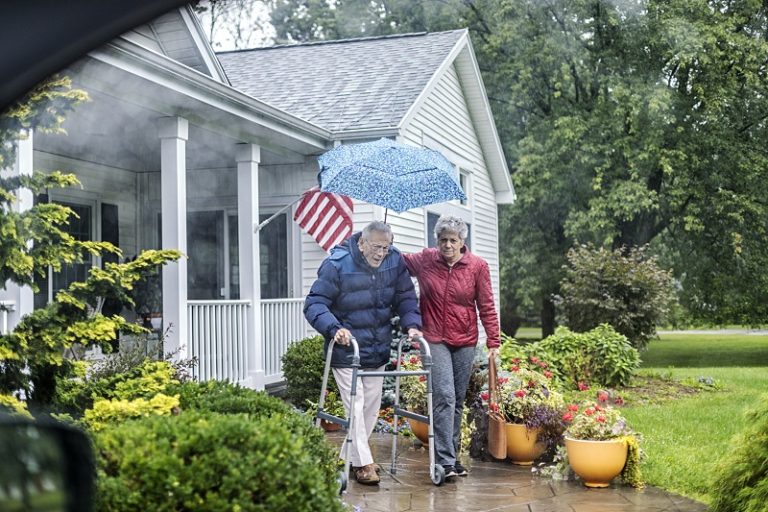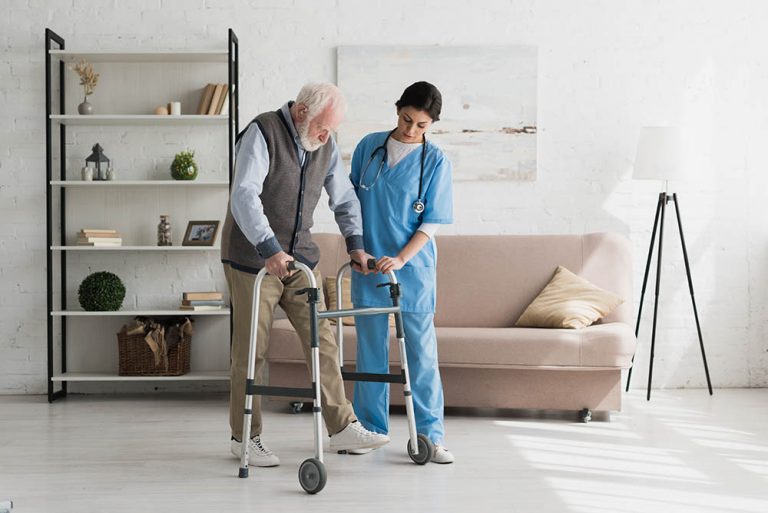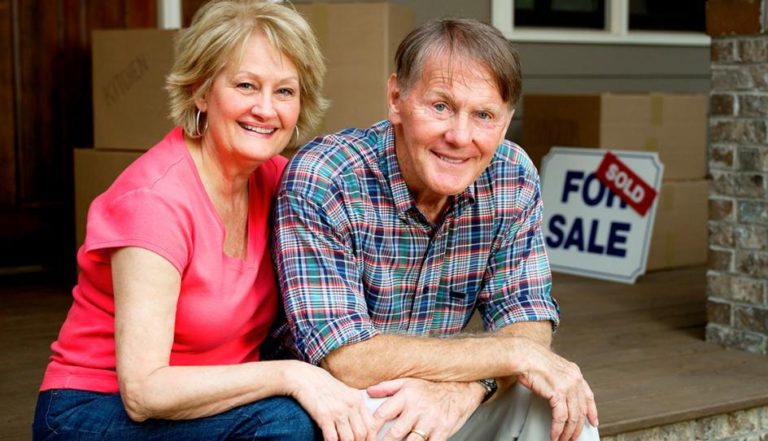An oral history of toil, toll—and loving devotion
This very morning, in tens of millions of homes across the land, a spouse, child, friend or parent will offer a steady hand to an older or infirm loved one, getting her dressed and fed, organizing pills, taking medical readings, setting him up for the day ahead. Later on, these family caregivers might pay their loved one’s bills, deal with insurance claims, even do their shopping. Only when all that is handled can they focus on their own lives. To reveal the full span of their devotion, challenge and frustration, AARP interviewed dozens of caregivers. Here’s a glimpse of life from some of them.
FIRST SIGNS
Bryan Kramer (52; he has been caring full-time for his now 54-year-old wife at home in Hemet, California, since May 2016): It was Friday the 13th, and I got a call at work from my sister-inlaw saying she couldn’t get into our house. I knew my wife was home, so I rushed over. The door would only open about 2 inches because my wife was on the floor. Norma was alive, but she’d had a massive stroke—at the age of 48.
Janet Lenius (57; she has gradually taken on more caregiving responsibilities at home in Minneapolis as her 89-year-old mom’s health has declined): It wasn’t one thing; it was lots of things. Pneumonia, a heart condition, hospitalizations, mild cognitive impairment that kept getting worse. I had to step in.
Laura Crews (64; a hired aide helps by day, but she takes over caregiving after work for her husband, 67, who has frontotemporal dementia, at their home in the Seattle area): For a while Don didn’t need care every minute. But then I’d come home and find bizarre things. He broke a plate and tried to glue it with Gorilla Glue and got glue everywhere. Then he took it on himself to repair the deck by drilling in random screws. I was horrified. Don was a Boeing engineer, but now he didn’t have any idea what he was doing. Somebody had to watch him.
In 2020, 26% of U.S. caregivers were tending to someone with dementia or Alzheimer’s disease, up from 22% in 2015.
Amy Goyer (61; AARP’s national family and caregiving expert, has been a caregiver since age 20 for various family members): I’m the youngest of four girls, I wasn’t married, I didn’t have children, I worked in aging. It was only natural that when my grandparents needed help, I set up services, monitored care, even put up the Christmas tree and fixed their old Victrola.
Carol McCarrick (64; she works full-time while also caring for her husband, 70, at home in Kerrville, Texas, since 2013): Steve worked full-time, and on the side rode horses, took 150-mile bike rides, taught classes. One day he came in and just dropped from an aneurysm. We live in rural Texas. He had to be airlifted. If I wasn’t there, he would have died.
Karen Mason (62; she cares for her disabled adult daughter at home in Forrest City, Arkansas): Tasha, my daughter, was born with cerebral palsy. Taking care of her wasn’t a choice. It’s been my reality every day for 37 years.
Jeanie Olinger (61; she has overseen care fulltime for her 38-year-old son in Oklahoma City since his 2008 car accident. She also cared for her aunt at home and in a nursing home until her aunt’s death last September). I remember going for a walk as they bathed Chris at the hospital. He was 24 and had suffered brain injuries they said would be permanent. I realized this was going to be a long journey, but I committed to it. In that instant, I let go of whatever I thought the future looked like.
THE CONFUSION OF CARE OPTIONS
Laura Crews: I didn’t know what to do, honestly. I just started searching online for “caregiver.” You see all these choices: adult day care, in-home care, nursing facilities, assisted living, continuing care. You call places and everybody says, “Yes, yes, we can help.” But I never really felt good about these conversations. Everything felt like a sales pitch. Then my neighbor said, “Hey, I know this older lady who might help.” She’s been with us ever since.
Karen Mason: You piece it together. Family, hired help, respite care. No way was I putting my daughter in a nursing home. When I was younger, I worked as a visiting nurse in some of the finest facilities money can buy. Chandeliers, baby grand pianos. But the care was deplorable.
Zander Keig (55; he is a trans man and Coast Guard veteran caring for his Marine Corps veteran father, who’s 81, in Daytona Beach, Florida): I got Dad enrolled in the geriatric clinic at the local VA and a VA-sponsored adult day care program. He moved in with my wife and me, but at a certain point, we noticed things— like Dad no longer understood how to operate the microwave. He couldn’t be left alone all day. We found a residential facility nearby with six bedrooms that looked great but was $3,000 a month, and my dad was only getting $1,740 a month from Social Security. We ended up having to put him in a much larger independent-plus program at an assisted living facility about two and a half hours away.
More than one-quarter of American family caregivers in 2020 said they had difficulty coordinating care
Rachel Hiles (35; she lives in Kansas City, Missouri, and cared for her grandmother until she died in January at age 85): I wish we’d had a conversation before any of this. My mom passed away. I’m an only child, and my grandma’s an only child, so her care fell to me.Right before COVID, she got pneumonia andwent into the hospital. I had a choice: Take her home or send her to rehab. Neither was perfect. I took her home.
Steve Cogburn (69; he cared for his wife, who had heart disease and dementia, for eight years at home and in hospitals and nursing homes around Holyoke, Colorado, until her death in 2020): In our rural area, there was no home health care. Zero. The closest was about 50 miles away. They would send an aide out twice a week for one hour a day and that served no useful purpose whatsoever. It was all on me.
Carol McCarrick: You wouldn’t believe how many people asked me in the beginning if I was going to stay with Steve. And I was, like, well, why wouldn’t I? You think you know about love, but you really don’t until you have to take care of somebody.
THE FINANCIAL MANEUVERING
Laura Crews: Right now we’re OK, but who knows? Don has a pension from Boeing, he’s getting Social Security, I’m still working. But all of my salary goes to the lady who watches him during the day. I’ve had to buy a hospital bed, a lift chair. I pay an extraordinary amount for an expensive medication he needs. I wish we had gotten long-term care insurance.
Carol McCarrick: That little helicopter ride was $25,000. While Steve was in the ICU, I had to have the house completely redone. Doors enlarged, bathrooms overhauled, carpets up. It took all our savings, about $80,000. Steve was eight months from full retirement at his state job and I begged them for full benefits, for his pension and all that. But they wouldn’t go for it. So, now, instead of thinking about retirement in a year, I’m working 10 hours a day as a social worker so I can pay for caretakers.
Bryan Kramer: I do get paid, through IHSS, which is California’s In-Home Supportive Services. Well, Norma gets paid to pay someone— that someone happens to be me.
Amy Goyer: People don’t understand the true cost. Daddy got veterans’ benefits, which was game-changing as far as helping with medical equipment, incontinence supplies, medications, ramps, a few hours of home health aides. But with Alzheimer’s, the costs keep escalating as the condition worsens. As I cared for both my parents, initially, I had to use my credit card to help cover whatever their budget couldn’t. While I eventually stopped doing that, the interest accrued. By the time Dad died, I had to declare bankruptcy.
45% of U.S. caregivers today say they have suffered at least one financial impact.
Elois Wiggins (70; she is caring for her oldest sister, who has advanced Alzheimer’s, 10 days each month on a rotation with other family members in Suffolk, Virginia): The family pulled together to share in this experience, and we have witnessed God meeting every need. We get by. I retired in 2008 but still work part-time. I honestly can’t think of anything better I can be doing with my salary.
About half of African American caregivers feel they had no choice in taking on their role, but the majority say they find a sense of purpose or meaning as caregivers.
WHAT IT’S LIKE
Jeanie Olinger: You know how the pandemic shut everything down and everybody stayed inside, ordering things off Amazon and watching TV, and mostly seeing the people you’re living with and taking a thousand precautions and only going out in true emergencies? That’s caregiving, COVID or no COVID!
Bryan Kramer: It’s nonstop: Physical therapy twice a week, what I call depression therapy every Friday. Norma has a neurologist, an eye doctor, a dentist, a podiatrist, an occupational therapist. I set an alarm for her 7 a.m. pills and her 7 p.m. pills and her 10 p.m. pills. It’s hard to take good care of yourself. I’ve gained about 50 pounds.
Janet Lenius: I bought Mom expensive hearing aids a couple months ago, but they were stressful and confusing for her, and she kept losing them. One day I spent about eight hours searching, and they were hiding in plain sight on a ring holder. I ended up returning them because I couldn’t take the anxiety of worrying about something worth two diamond rings that Mom wasn’t using.
Karen Mason: Every day it’s the same routine: Get her up, wash, diaper, medicate, breakfast, lunch, dinner, laundry, in and out of the wheelchair. My daughter is 230 pounds. I’m on disability. I’ve had two failed back surgeries. Every joint in my body hurts, but you push that aside.
In 2020, 23% of American caregivers said caregiving had made their own health worse.
Sharon Childs (57; she is caring for her mother, 80, who lives nearby in Baltimore): You need to become an advocate for everything. My mother’s jaw got dislocated, and the ER told me there was a no-visitors policy due to COVID. I filed complaints with the patient advocacy department, the state health department and the health commissioner. Finally, the ball started rolling. The patient-support person said, “Well, you got what you wanted!” I corrected her: “No, my mother got what she had a right to!”
Laura Crews: I feel robbed. Don was going to retire, and we were going to travel. We were saving for a trip to Bora Bora. We were going to go out to dinner and take our grandchildren on trips. It’s not supposed to be this way, especially at our age. I’m angry.
Amy Goyer: You’re always thinking about falls. I slept outside my mother’s bedroom on a couch near the door. I gave her a bell to ring if she needed to go to the bathroom. One night she didn’t ring the bell and I didn’t hear her, and she fell and fractured her spine. That led to 40 days in the hospital, and I was there 24-7 for all but five of those days.
Rachel Hiles: It can be challenging. I felt like I was constantly lying to Grandma. She’d tell me she’s late for work or school or church or some big party I know happened 50 years ago. I’d say, “Oh, Barbara Lynn, that party’s next Friday.”
Laura Crews: A lot of friends have dropped away, and that’s OK. I totally understand. Nobody wants to hang around with a person who drools or claps all the time. People don’t know how to react. I get that. But caregiving can be the loneliest job in the world.
COPING STRATEGIES
Carol McCarrick: I think caretakers really need therapy. It helps so much. You get a lot of guilty thoughts, there’s resentment, there’s frustration.
Jeanie Olinger: Prayer is a large part of it. There’s a line in Psalms that goes: “When my heart is overwhelmed, lead me to the rock that is higher than I.” Faith helps. So does coffee. Lots of coffee.
Sharon Childs: I always force myself to remember that at one time my mother was able-bodied and she walked and danced and was a seamstress and an amazing cook.
34% of American caregivers in 2020 were boomers.
Laura Crews: You figure it out as you go. I’d never mowed the lawn before. I never understood cars or handiwork. A friend helped me change the car battery. I fix things around the house now. Toilet’s broken? Don’s certainly not gonna fix it. Come on, Google!
Zander Keig: As a trans man, there are some unique situations with my father. As his memory fades, he may not remember that I transitioned 17 years ago and he might ask, “Where’s my daughter?” I’ve been advised by a dementia care specialist not to challenge— but rather to ask questions like, “Where does your daughter live? Tell me about her.”
Janet Lenius: I try not to get resentful. I tell myself Mom’s just generous. But it’s incredibly frustrating when I bring her Meals on Wheels and find later that she’s given her lunch to the cat at her feet.
Bryan Kramer: I went to a chiropractor one time and she said, “Can I ask something personal? How do you do it?” I kinda broke down with a tear. I said, “I just do.” The truth is, I was in the Navy in the days before they took out the hazing. If I could become a shellback, I can take care of someone I love.
Carol McCarrick: A few months ago I went to my school reunion. That was the first time I’ve really been away from him. The reunion was fine—but just staying in a hotel by myself, being in the car, driving down the highway, blasting the Eagles, it was pure freedom.
GLIMMERS OF JOY
Carol McCarrick: Believe it or not, we still laugh. We get snakes here in Texas. I’m terrified, but I have to deal. I was picking one up with a stick when my husband rolled into the yard and fell out of his wheelchair. I’m out there, flinging the snake over the fence and standing there thinking, Oh, thank God that’s gone! My husband’s flat on the ground going, “Hey, wait, what about me over here?” We both cracked up.
Bryan Kramer: If the temperature’s right, we go kite flying. I tie the line to Norma’s wheelchair, and she just giggles when she sees the kites soaring above.
Rachel Hiles: Every day, at least one good thing happened. If my grandma remembered my name, that was a good thing. Sometimes, it was just the sun shining. You have to look for these moments.
Sharon Childs: I post these jokes on AARP’s caregivers Facebook page. Silly stuff, like, “The best five seconds of the week is having an empty laundry basket.” No matter what we’re going through, it helps add a little cheer. 61% of today’s family caregivers work other jobs.
Janet Lenius: Mom doesn’t have a TV, but lately I’ve been getting DVDs from the library and watching them with her on the laptop. Old comedies like The Carol Burnett Show and The Bowery Boys and even Steve Martin movies. She’s loving those. We both are.
Steve Cogburn: We had a friend from church who’d lost her husband recently. I was afraid to ask anyone for help; I think a lot of men are. But sometimes she would insist on coming over. She’d sit with Marcia so I could get a break and read jokes from Reader’s Digest. Marcia told me she didn’t understand them, but I could see how happy she was.
Amy Goyer: When my parents went into a nursing facility, I began to play the piano during dinner. And it would bring so much joy, not only to my mom and dad but to all the residents and to me. Singing those old songs, like “In the Good Old Summer Time,” really lit the place up. Even until the very end for my dad, at 94, music was how we connected.
ENDINGS AND BEYOND
Steve Cogburn: It wears on you emotionally, financially and every other way. Toward the end, I prayed to God to not make Marcia suffer anymore. He answered my prayers on a Friday night. I was doing what I always did. At 8:30, I put her pajamas on, turned down the bed and brought her into the living room so we could watch a half hour of the news. As I lifted her into her wheelchair, she said my name, and then she passed. To be there for her in that moment meant everything.
Amy Goyer: When my father died, some people immediately said, “You must be so relieved.” I was deeply offended by that. The truth is, I missed him. I still do. It wasn’t until he died that I realized how important taking care of him had been. It gave me purpose. Some people think caregiving is putting your life on hold. I disagree. Caregiving is putting the fullest part of yourself to work.
Bryan Kramer: I had a cast made of our hands. My hand is intertwined with Norma’s and we’re holding a rose. It gets me emotional looking at it. No matter how tough things get, Norma and I are still in this together.
Laura Crews: We’ll never see Bora Bora. I’ve made peace with that. We should have done it when we were younger. Don’t put things off. You don’t know what’s going to happen tomorrow.
Rachel Hiles: It comes down to the golden rule, you know? I hope in the future when I’m my grandma’s age, I’ll have somebody like myself to take care of me. who drools or claps all the time. People don’t know how to react. I get that. But caregiving can be the loneliest job in the world.

